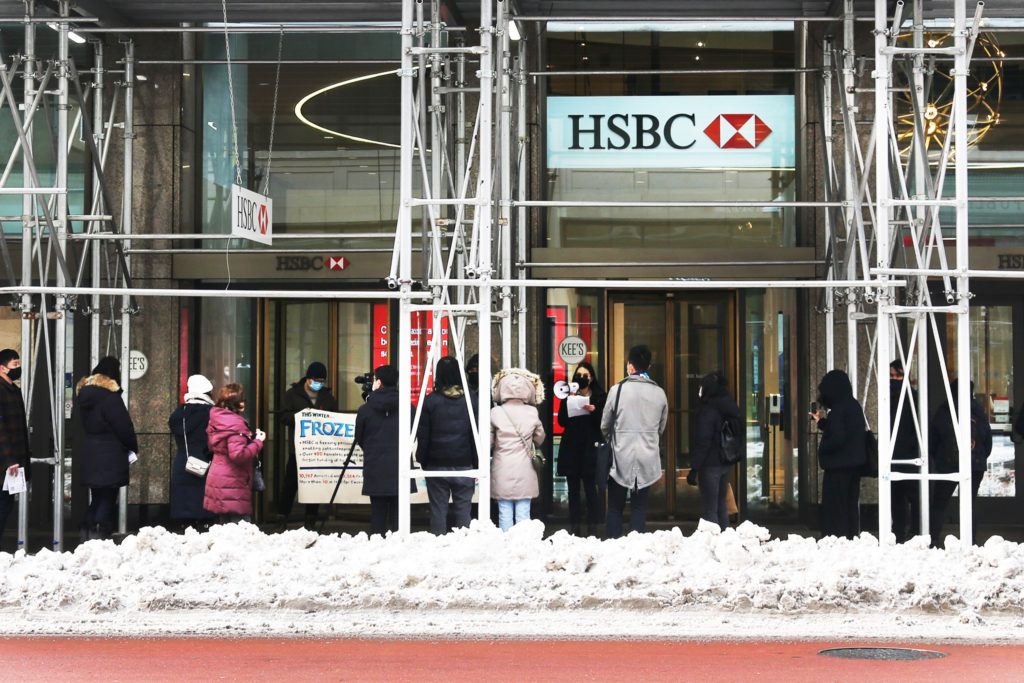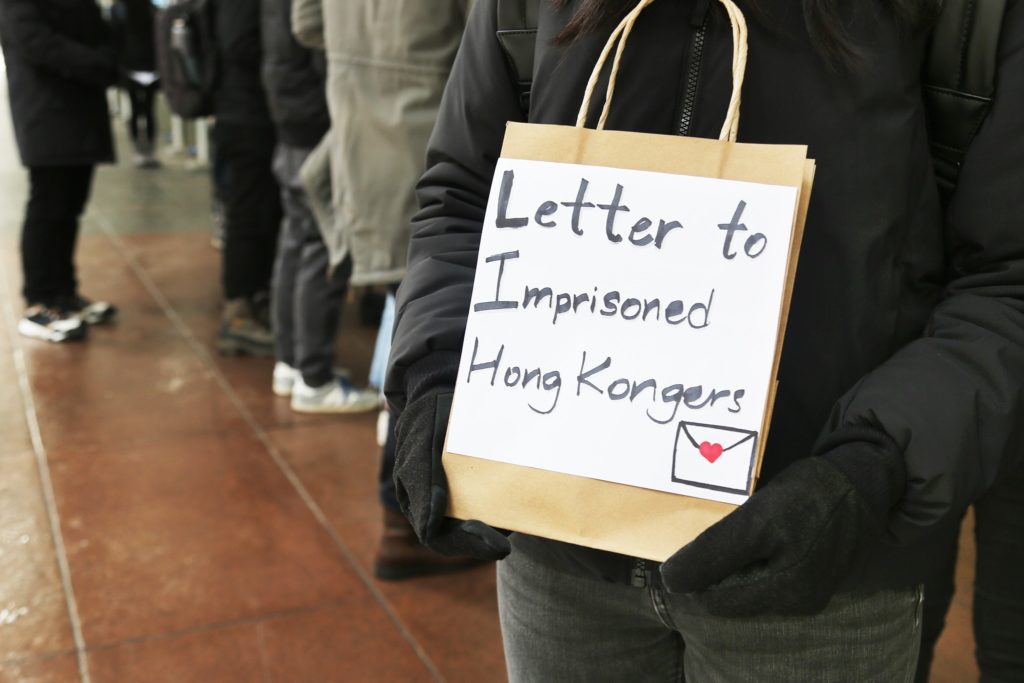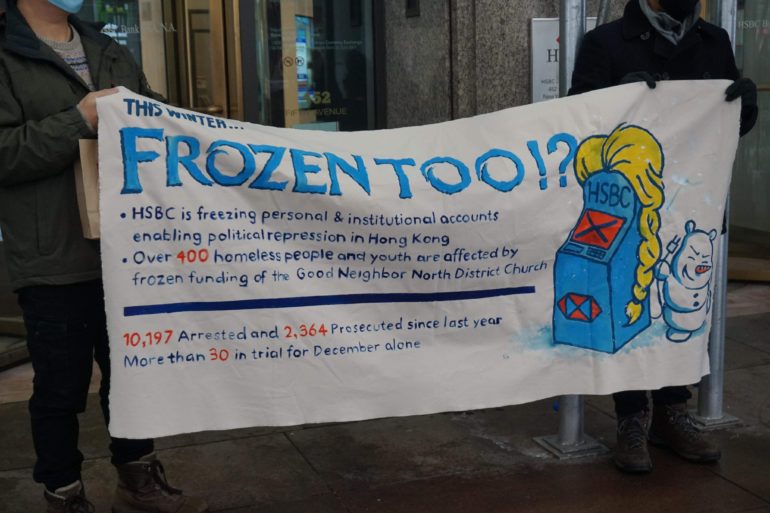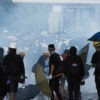Lausan and Lion Rock Cafe organized an action at the HSBC headquarters in Manhattan, New York City on 19 December 2020, inviting friends from our community to demand the unfreezing of Hong Kong activists’ accounts and condemn big banks’ role in state repression, policing, and privatization from NYC to Hong Kong.
Read our statement below. Also available in Chinese.
We gather today in solidarity with former legislator Ted Hui, with Good Neighbour North District Church in Hong Kong, and with all those affected by HSBC’s decision to freeze their bank accounts. Last week, HSBC, Hang Seng Bank, and Bank of China froze the personal accounts of Ted Hui and his family with no explanation. This followed news of his exile at the start of the month, and was followed by the Hong Kong police alleging money laundering in order to pursue national security law charges against Hui on Monday, 6 December.
On Tuesday, the bank accounts of Roy Chan, pastor of Good Neighbour North District Church, as well as the church’s own accounts, were frozen. There has again been no explanation from HSBC and was again followed the next day by Hong Kong police action: searching two of their churches, three of their shelters, and the arrests of two people—one former and one current employee. Good Neighbour currently runs homeless shelters, providing more than 30 free hostel beds, in the districts of North District, Yuen Long, and Kwun Tong. In a city notorious for its housing crisis, Hong Kong’s government has consistently failed to provide adequate, affordable housing for its residents and to provide basic social services to its homeless people.
In 2017, the government’s census reported that 30.4% of households lived in public rental housing and 15.3% in subsidized home ownership, which means that 45.7% of the population lives in some form of public housing. In this time of pandemic, “up to 780,000 Hongkongers now live in public rental housing, and as many as 240,000 were unemployed.” The government has not provided unemployment welfare support, but has instead raised rent by nearly 10%. In a city where the government owns all land (except for an Anglican cathedral), the government refuses time and time again to build adequate housing, provide equitable housing, and care for its homeless, but chooses to court capital in the form of big banks and real estate corporations.
Non-profits, including churches like Good Neighbour, have had to fill this void of social services in local communities. The freezing of the church accounts means that they are unable to continue to provide services, thereby “forcing the homeless to be homeless again” during the fourth wave of the coronavirus. The church is clear that this is an act of political retaliation against their role in the past year’s protests. Members of their ministry to “Safeguard Our Generation” on the frontlines were middle-aged and elderly volunteers who put themselves between young protesters and riot police, as embodied acts of de-escalation and intervention of police brutality.
That big banks are actively participating in the state now persecuting its protesters and their sympathizers is, of course, not incidental. That Hongkongers continue to be elided with this fantasy of a capitalism that works and its extravagant economy—even as we live under precarious, inequitable housing conditions and unjust labour practices—is not a coincidence. We are exploited by business and government elites who care first and foremost about Hong Kong’s reputation and function as a place of commerce. Our identity is then weaponized by so-called allies who care about the corrosion of our human rights only insofar as it damages that same reputation—and their ability to do business in the city and to continue the extraction of profit from our labour. They weaponize our struggle and identity as “Hongkongers” against our families across the Chinese border and our co-strugglers against the Chinese Communist Party (CCP). And in the diaspora, this performative allyship is used as a Trojan horse for their Sinophobia and Cold War politics and blatantly xenophobic immigration policies.

The complicity of big banks in colluding with a government and a police force that are so intent on intimidation and in seeding fear shows us all just who they view as acceptable collateral damage in their project of protecting capital. And to whom we, as leftists, must be all the more committed in our solidarity.
In the diaspora, we must refuse to be used as a racial wedge between our Black and Brown siblings of color. We must see our struggles as interconnected with our neighbours’. We advocate against the violent act of eviction, especially during a pandemic and as the clock runs out on New York eviction protections. We know that the policing tactics in Hong Kong and the US may have different historical roots, but they are intertwined, as is the “counter-terrorism” rhetoric used by the NYPD, the national security laws of Hong Kong and China, and the Philippine Anti-Terrorism Act.
Our experience with the cruel absurdity of white elephant projects—like the building of artificial islands between Hong Kong Island and Lantau Island, ostensibly to solve the housing crisis in Hong Kong—makes our solidarity with Flushing residents even more imperative. It is transnational capital by way of wealthy Chinese American developers, with a 100 million dollar loan from the Bank of China, in concert with complicit City Council members that is rapidly escalating the gentrification in the neighbourhood. We unequivocally amplify the demands of Flushing coalitions for “more affordable housing, sanitation services, schools, senior and youth centers, union jobs and green spaces.”
In a landscape shaped by competing empires and powers, Good Neighbour Church lives out their answer: solidarity on the frontlines and with the most vulnerable members of society. Their work of justice calls us to build our solidarity with the working class, the shelterless, the imprisoned, and all oppressed people of the world. We know that our strength is found in community with each other, that our liberation is bound up with yours, and that none of us are free until all of us are free.
Today, we choose and we demand a better world together. We demand that HSBC unfreezes immediately all relevant accounts of Ted Hui, Roy Chan, and Good Neighbour North District Church. We call for the global boycott of HSBC and the withdrawal of funds. We demand an explanation for the freezing of accounts. We call for the signing of Good Neighbour’s global petition. We demand that the police drop all charges. We demand an independent inquiry into the Hong Kong Police Force, the release of all arrested protesters, and the abolition of all police everywhere.





